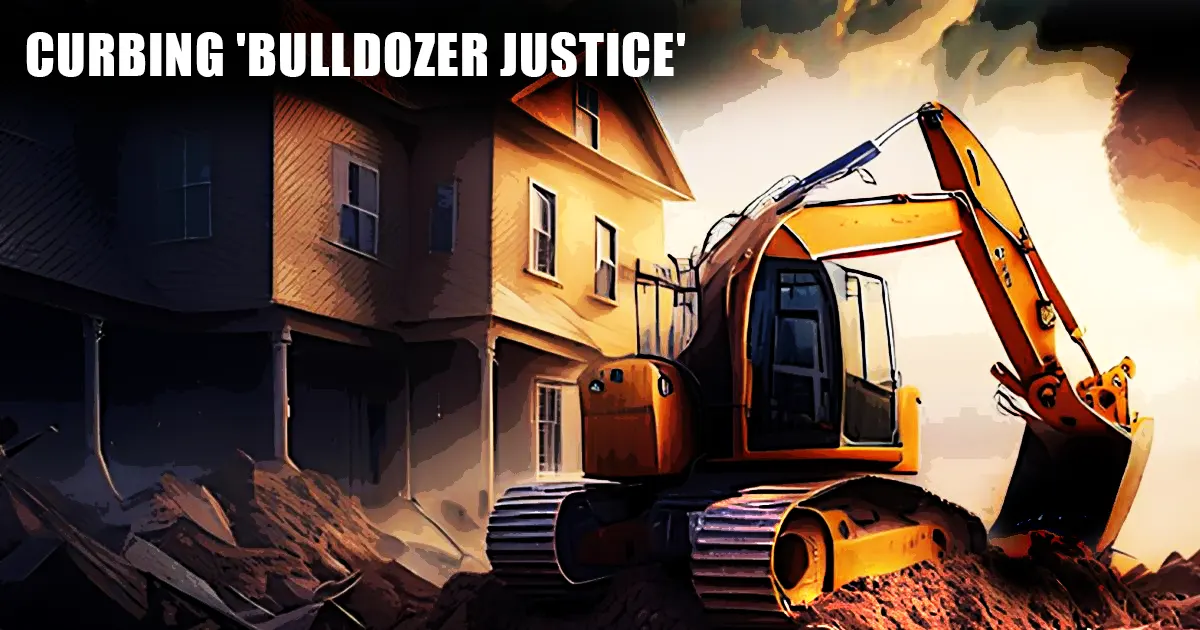
Context:
The Supreme Court has intervened due to increasing arbitrary demolitions, directing the enforcement of due process through new guidelines to prevent unfair demolitions, especially targeting marginalized communities.
What is ‘Bulldozer Justice’?
It refers to the use of demolitions as extrajudicial punishments, bypassing legal procedures. Often, this affects individuals or communities accused of crimes without going through due process.
Issues with ‘Bulldozer Justice’
- Due Process Violations: Demolitions conducted without following legal procedures violate fundamental rights under Articles 14, 19, 21, and 300A of the Constitution.
- Contravention of International Obligations: It violates Article 87(3) of the Geneva Convention, which prohibits collective punishment, conflicting with India’s commitments under Article 51 of the Constitution.
- Selective Enforcement and Lack of Resettlement: Reports show that demolitions often target vulnerable communities without ensuring resettlement or compensation.
Supreme Court’s Response and Core Guidelines
Pre-Demolition Safeguards:
- Mandatory Notice Period: Property owners must be given 15 days’ notice with reasons for the demolition and opportunities for regularization.
- Documentation: A thorough inspection report, signed by at least two witnesses, and video documentation must be prepared before demolition.
- Right to Hearing: Property owners must be allowed to contest the demolition order, with all objections documented and a formal decision provided.
Accountability and Legal Compliance:
- Officials’ Accountability: If guidelines are violated, disciplinary action can be taken, and officials may be held liable for damages.
- Public Access to Records: Demolition records must be available on a public portal, ensuring transparency.
Post-Demolition Rehabilitation:
- Compensation and Resettlement: Families whose property is demolished must be provided with financial compensation and alternative housing.
Checks Against Selective Enforcement:
- Preventing Executive Overreach: Demolitions cannot be based purely on accusations or political influence.
- Anti-Bias Enforcement: The guidelines ensure no bias in targeting specific individuals or groups.
- Digital Tracking System: A portal will track all procedural steps, including notices and final orders, ensuring transparency.
Key Case Backgrounds and Judicial Findings
- Maneka Gandhi Case (1978): Demolitions without evidence or trial violate due process under Article 21.
- Olga Tellis Case (1985): The right to shelter is part of the right to life, and demolitions without notice violate this right.
- K.T. Plantation Case (2011): Property deprivation under Article 300A must follow laws that are just, fair, and reasonable.
Implications of Supreme Court Guidelines
- Uniform Nationwide Standards: All states and Union Territories (UTs) must follow these standardized guidelines, protecting citizens’ property rights nationwide.
- Ensuring Public Trust: The judiciary ensures that constitutional rights are upheld, strengthening public confidence in state actions.
- Protecting Rule of Law: The Supreme Court’s judgment emphasizes that demolitions must follow strict legal procedures, reinforcing rule of law.
- Deterring Arbitrary State Actions: The new guidelines aim to prevent the misuse of state power, reducing selective demolitions in the name of public order.
Question
[box]Critically examine the concept of ‘Bulldozer Justice’ and discuss the Supreme Court’s guidelines to curb arbitrary demolitions, ensuring due process and protection of fundamental rights.[/box]




